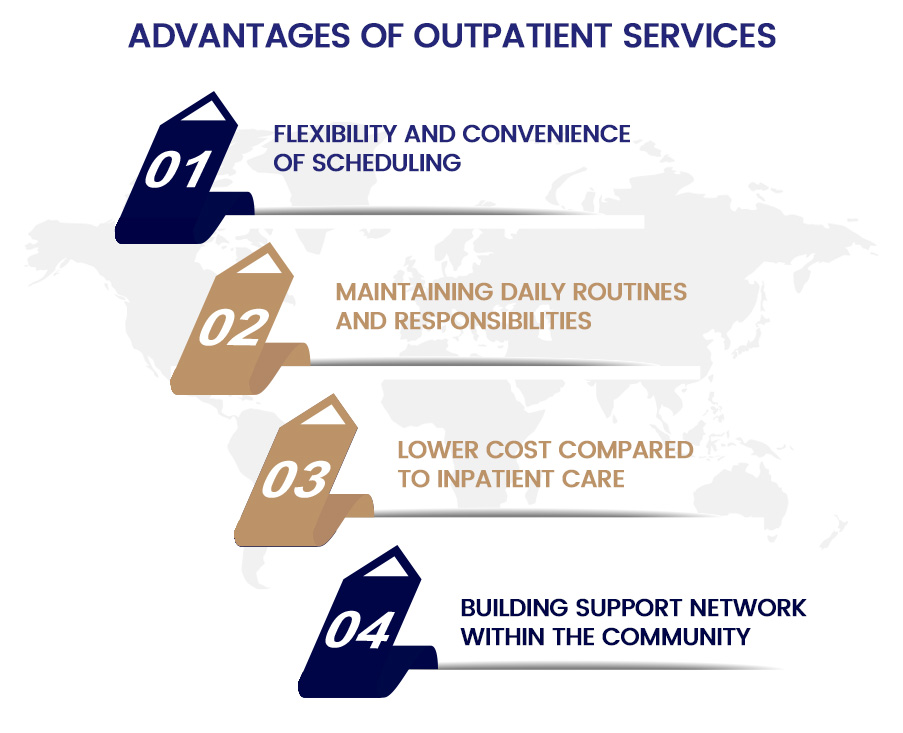Outpatient mental health services are therapy and treatment choices that people can use without going to a hospital or a residential facility.
These services are provided on an appointment basis, allowing individuals to receive the necessary support while continuing to live in their own homes and communities.
For overall wellness, seeking mental health care is necessary. A person’s life can be significantly impacted by mental health issues, therefore seeking assistance as soon as possible can improve outcomes and quality of life. An excellent option for people to address their mental health issues and receive the attention they require is through outpatient programs.
In this blog we will dive into the advantages and varied features of outpatient mental health care in Largo, Maryland. People can choose the best help for their mental health needs by being aware of the many services that are offered including their benefits.
What are Outpatient Services
Types of professionals and therapies available
Common Outpatient Mental Health Services
Individual therapy/counseling
Individual therapy is when you meet with a mental health worker one-on-one to talk about your problems. Learn how to deal with them, and work on your own growth and healing.
Group Therapy and Support Groups
Group therapy gives people with similar problems a safe place to share their experiences. Gain new insights, and learn from each other with the help of a trained therapist. Support groups focus on specific topics or conditions, fostering connection and mutual support among participants.
Psychiatric Medication Management
Psychiatric Medication Management involves prescribing and monitoring medications to address mental health conditions. Psychiatrists or other specialized medical professionals assess symptoms, prescribe appropriate medications, and provide ongoing monitoring and adjustments as needed.
Intensive Outpatient Programs (IOP)
IOPs are structured programs that offer comprehensive treatment for individuals with more severe mental health conditions. These programs typically involve several hours of therapy and support per day, allowing individuals to receive intensive care while residing at home.
Partial Hospitalization Programs (PHP)
PHPs provide a higher level of care than traditional outpatient services, offering full-day or half-day programs where individuals receive treatment and support while living at home. PHPs are good for people who need more thorough treatment but don’t need to be in a hospital 24 hours a day.
Importance of Outpatient Care Over Inpatient or Residential Treatment
Outpatient care offers several advantages over inpatient or residential treatment options. It allows individuals to remain connected to their support networks, continue their work or education, and fulfill family responsibilities. Outpatient services in Largo, Maryland also tend to be more cost-effective and can provide a smoother transition back to daily life.

Advantages of Outpatient Services
Flexibility and Convenience of Scheduling
Outpatient services offer flexibility and convenience when it comes to scheduling appointments. Individuals can often choose appointment times that suit their availability, making it easier to integrate mental health support into their daily lives. This flexibility allows individuals to maintain work, education, and other commitments while still prioritizing their mental health.Maintaining Daily Routines and Responsibilities
One significant advantage of outpatient care is the ability to maintain daily routines and responsibilities. Unlike inpatient or residential treatment, individuals receiving outpatient services can continue living at home, engaging in their regular activities, and fulfilling their responsibilities to family, work, and other obligations. This continuity helps promote stability and minimizes disruptions to their lives.Lower Cost Compared To Inpatient Care
Outpatient services generally come at a lower cost compared to inpatient or residential treatment options. Inpatient care involves the expenses of accommodation, meals, and around-the-clock monitoring, which can be costly. Opting for outpatient care can be more affordable and accessible for individuals who may not require the intensity of inpatient treatment or have financial constraints.Building a Support Network Within The Community
Engaging in outpatient services allow people to build a support network within their community. Group therapy and support groups are ways to meet people who have been through similar things and are facing similar problems. This sense of community can provide validation, understanding, and encouragement, fostering a supportive environment that aids recovery. For More Read Now: Empowering Recovery: A Closer Look at Psychiatric Rehabilitation Program ModelsFinal Words
Largo, Maryland’s outpatient mental health treatments have several advantages. They make an effort to provide people the freedom to choose their own schedules so they may fulfill the responsibilities . Outpatient treatment also promotes a feeling of community by creating a support system in one’s own home.
It is essential to look into and use these resources, asking for assistance when necessary. Making mental health help a top priority is a proactive move towards better health and a happy life. Keep in mind that asking for assistance reflects confidence and self-care
FAQS
Outpatient services refer to therapy and treatment options provided outside of a hospital or residential facility, allowing individuals to receive support while living at home.
Outpatient mental health services are offered by professionals such as psychologists, psychiatrists, therapists, counselors, and social workers who specialize in mental health care.
Outpatient services provide flexibility in scheduling, allow individuals to maintain their daily routines, are often more cost-effective than inpatient care, and offer opportunities to build a support network within the community.
Outpatient services include, among other types of treatment, individual therapy, group therapy, medication management, intensive outpatient programs (IOP), and partial hospitalization programs (PHP).
To access outpatient services, people can go to mental health clinics, private practices, or community mental health centers. Referrals may also be obtained through primary care physicians or healthcare providers. Considering insurance coverage and financial aspects is important when seeking outpatient care.

